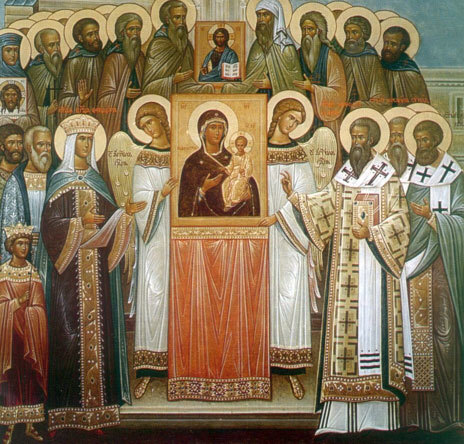If the first four Sundays of Triodion can be linked through what we call theology path or road believers in a direction favorable or contrary to the new assessed against our position towards God and neighbor, next Sunday as part of the relationship issues of freedom and dynamism of its acquisition. This freedom must be seen not as an intermediate point between two realities contrary or the option to choose between good and evil. Freedom authentic Christian doctrine exists only in relationship with God. The fall in relationship with God is the fall of liberty. We are free and we are able only natural when we are in communion with God and thus better understand his words: “The opposite of sin is not virtue, but freedom.” Sundays of Lent offers a broad perspective on the framework, resources, and route patterns acquiring our freedom in God.
 First Sunday of Lent, the Sunday of Orthodoxy, discovers jelly or acquiring the most natural of freedom. Orthodoxy, Fr. Dumitru Stăniloae said, is “full rhythm of life.” Church freedoms and our full space is real environment of sharing God’s participation in the communion or “circuit of divine love,” guaranteeing the living reality and pulse deification. Orthodox teaching truth, far from being an abstract one cold and irrelevant to life, structured human person, embodies and coordinates. This “truth makes us free” for killing us own idols fashioned as truth instead of one truth that Jesus Christ is the Savior.
First Sunday of Lent, the Sunday of Orthodoxy, discovers jelly or acquiring the most natural of freedom. Orthodoxy, Fr. Dumitru Stăniloae said, is “full rhythm of life.” Church freedoms and our full space is real environment of sharing God’s participation in the communion or “circuit of divine love,” guaranteeing the living reality and pulse deification. Orthodox teaching truth, far from being an abstract one cold and irrelevant to life, structured human person, embodies and coordinates. This “truth makes us free” for killing us own idols fashioned as truth instead of one truth that Jesus Christ is the Savior.
 Sunday of St. Gregory Palama, the importance and the decisive role of Saint hesychast affirming uncreated divine grace, freedom becomes relevant precisely because the problem resource pinpoints freedom and a score in terms of participation and sharing. God alone is absolutely free and is open by himself. The human person is free only for attending divine freedom, partakes of it and because it is given by God of love. Abdication of this sharing in communion with God is bondage.
Sunday of St. Gregory Palama, the importance and the decisive role of Saint hesychast affirming uncreated divine grace, freedom becomes relevant precisely because the problem resource pinpoints freedom and a score in terms of participation and sharing. God alone is absolutely free and is open by himself. The human person is free only for attending divine freedom, partakes of it and because it is given by God of love. Abdication of this sharing in communion with God is bondage.
 Third Sunday of Lent, called the Sunday of the Holy Cross, highlights the relationship between sacrifice and freedom. Modern society, hedonism captive in cheap and immediate forms, removed her from the Cross. Comfort and fascination passions, ephemeral and superficial illusion enslaving decreed absurd, crazy and pointless sacrifice. But there is no freedom without sacrifice, without proper and sustained effort against sin and passions. Sacrifice and asceticism is “killing death of us” that human nature captivity to release her, as says Saint Maximus the Confessor, and to breathe the air of freedom.
Third Sunday of Lent, called the Sunday of the Holy Cross, highlights the relationship between sacrifice and freedom. Modern society, hedonism captive in cheap and immediate forms, removed her from the Cross. Comfort and fascination passions, ephemeral and superficial illusion enslaving decreed absurd, crazy and pointless sacrifice. But there is no freedom without sacrifice, without proper and sustained effort against sin and passions. Sacrifice and asceticism is “killing death of us” that human nature captivity to release her, as says Saint Maximus the Confessor, and to breathe the air of freedom.
 The following two Sundays, Sunday of St. John of the Ladder and Sunday St. Mary of Egypt, presents concrete route to freedom. If opera “ladder” of Saint John is considering acquiring freedom in the way the man of God, with breakdowns, failures, failures, successes and victories, his life, St. Mary of Egypt already discloses free man at the end of asceticism, unaffected by enslaving passions. Both St. John of the Ladder and Pious Mary of Egypt are brilliant testimony of the fact that freedom is brighter than sin and that the only career that lasts ages and career history is holiness, that of freedom. Sin only provide anonymous history.
The following two Sundays, Sunday of St. John of the Ladder and Sunday St. Mary of Egypt, presents concrete route to freedom. If opera “ladder” of Saint John is considering acquiring freedom in the way the man of God, with breakdowns, failures, failures, successes and victories, his life, St. Mary of Egypt already discloses free man at the end of asceticism, unaffected by enslaving passions. Both St. John of the Ladder and Pious Mary of Egypt are brilliant testimony of the fact that freedom is brighter than sin and that the only career that lasts ages and career history is holiness, that of freedom. Sin only provide anonymous history.
Triodion is fulfilled in the prologue epilogue Pentecostarion, Resurrection, which guarantees the open period. Appellation true freedom is universal and accessible “Be my servants be slaves freedom.”
Viorel Coman-Ziarul Lumina
